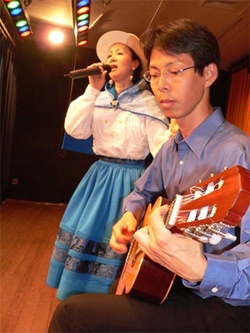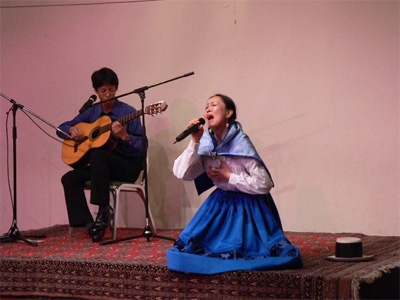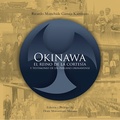Sin duda alguna, la historia de los músicos Parihuanita y Auki es muy singular. Ellos se presentaron recientemente en el Centro Cultural Peruano Japonés. Con emotividad y elegancia interpretaron la música andina peruana. Precisamente estas son las características que ambos, a pesar de no ser peruanos, mejor entienden y aprecian de este género musical. Esta nota narra la original vida artística del dúo, alternada con la bella presentación de aquel día.
Las luces del auditorio Jinnai se apagan. Auki entra al escenario, guitarra en mano. “Buenas tardes”, dice en español casi perfecto. “No hablo bien castellano”, agrega humildemente. Empieza a tocar El cóndor pasa. El sonido de su guitarra tiene un aire de arpa andina. La melodía evoca a las cumbres y valles de la sierra peruana. En la siguiente canción hace su entrada Parihuanita, vistiendo una pollera celeste. El tema es la Marinera Puneña. Parihuanita canta con voz aguda, típica entonación andina.
Las canciones que interpreta el dúo alternan la letra en quechua y en español. Quien no los conoce, no sospecharía que ninguna de éstas es su lengua nativa. El verdadero nombre de Parihuanita es Ayane Matsuzaki. Su nombre artístico proviene del de las aves blanquirojas que inspiraron a José de San Martín para los colores de la bandera peruana. Auki es en realidad Ryuya Aoki. A Parihuanita se le ocurrió que su apellido sonaba a la palabra quechua para viejo o sabio. El dúo se formó hace 18 años en la tierra natal de ambos: Japón.
El concierto continúa con una canción ayacuchana. Auki empieza a cantar con énfasis andino. Parihuanita baila en el escenario. Interrumpe su danza para cantar en quechua. El público los acompaña con las palmas.
Parihuanita conoce la música tradicional latinoamericana desde niña. Ya no recuerda por qué, ni cómo. De adulta empezó a interpretar música boliviana. Necesitaba a alguien que acompañara su voz con la quena. Así le presentaron a Auki, quien dominaba este instrumento. Parihuanita se enteró posteriormente de que Auki también tocaba la guitarra. Le propuso interpretar música andina peruana, él en las cuerdas y ella en el canto. Debido a su elegancia, Parihuanita ya le tenía un cariño especial a esta música.
“(La música de) Ayacucho tiene varias afinaciones”, dice Auki mientras va afinando su guitarra. “(La) guitarra es su enamorada”, bromea Parihuanita mientras el público espera impaciente el siguiente tema. “Es su enamorada porque tiene cintura”, agrega Parihuanita, refiriéndose a la curvatura del instrumento. El público suelta una carcajada.
El dúo se dedica profesionalmente a interpretar música peruana en Japón. Sin embargo, Auki confiesa que para poder viajar al Perú suele dedicarse a otros trabajos por tres meses, para costear el pasaje. Ambos visitaron por primera vez al Perú en el 2001. Cuentan con alegría que durante los seis meses que permanecieron, pasaron gran parte del tiempo en su pueblo predilecto: Ayacucho.
El auditorio Jinnai está casi lleno. Auki y Parihuanita introducen un nuevo tema diciendo que es muy triste y sentimental. Al empezar a interpretarlo, el aire del escenario cambia. La melodía de la guitarra ahora es melancólica. Parihuanita está cabizbaja. Su canto en quechua da la impresión de que terminará en llanto.
La pareja acostumbra presentarse en peñas de Japón. Sin embargo, afirman que la mayor parte de su público son japoneses. Sospechan que los latinos prefieren ir a locales de música salsa. Si encuentran peruanos entre los asistentes, suelen ser de edad avanzada. Parihuanita dice que los japoneses pueden entender muy bien la belleza del huayno. Cree que esto se debe a la cultura pacífica japonesa, que permite apreciar culturas ajenas sin prejuicios.
Para interpretar la siguiente canción, Auki afina nuevamente su guitarra. “Su enamorada, muy caprichosa”, le dice Parihuanita. Él público vuelve a reír. Cierran el concierto con un huayno ayacuchano. Las voces de ambos, acompañadas por la guitarra, forman un solo sentimiento. Al concluir, inmediatamente el público se pone de pie y aplaude.
Parihuanita conoció la música peruana mediante grabaciones en discos de vinilo y casetes. Posteriormente, gracias a empresarios japoneses, llegaron a Japón numerosos intérpretes peruanos. Esto ayudó a que el dúo japonés tuviera un mayor acercamiento a esta música.
El dúo produjo, en el 2002, un disco compacto titulado “Parihuanita y Aoki, música andina del Perú”.
Adjunto al disco, Raúl García Zárate, reconocido guitarrista Ayacuchano, presenta a ambos narrando anecdóticamente cómo los conoció: “…al finalizar mi primer concierto en la ciudad de Tokio, tuve la grata sorpresa de ser saludado en quechua por una pareja de jóvenes japoneses (…) al finalizar mi último concierto (…) me despidieron con la vestimenta típica de ayacucho, lo que me emocionó sobremanera…”
* Este artículo fue publicado originalmente en el sitio web de la Asociación Peruano Japonesa (APJ), Afiliado a Discover Nikkei.
© 2008 Asociación Peruano Japonesa and Yamato Icochea Oshima






